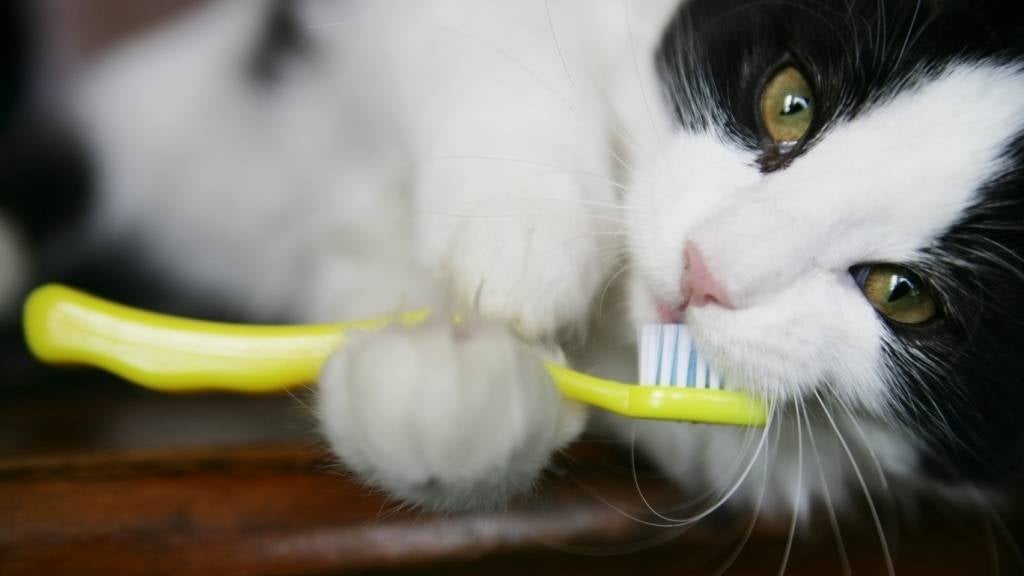A guide to cat dental health

Your cat’s teeth aren’t usually the first thing we think of when we think about cat health, but it is just as important as everything else – if not more so.
In fact, dental disease is one of the most common health conditions in cats, affecting as many as 70% of kitties over the age of 3. So it’s not just part of responsible cat ownership to look after your fur baby’s dental health, but as part of your whānau, you owe it to them to make their health a priority.
As well as following specific instructions from your vet, here are a few tips that will help you look after your cat’s oral health.
Good nutrition
Good dental health for your cat starts with good nutrition.
That means feeding them nutritious foods and not too many treats. A good crunchy kibble can also help to knock any plaque off their teeth, and there are several treat and food brands that offer benefits for your cat’s dental health.
Look for the Veterinary Oral Health Council seal of approval if you’re buying food or treats that will benefit their teeth, although keep in mind that this specific diet isn’t usually necessary unless your vet has recommended it.
Brushing at home
Did you know that you can brush your cat’s teeth at home?
This must be done with a specific pet toothpaste. Do not use human toothpaste – it is not formulated to be swallowed and can cause an upset stomach or digestive disturbances.
Dr. Helen Beattie (BVSc, Cert Animal Welfare Investigations) says this can be done at home, if you have the time and patience! “For those of you up for a challenge, and with plenty of time and patience, teaching your feline family member to have their teeth brushed is a great way to help maintain oral health and improve hygiene” explains Dr. Beattie.
Of course, many cats might turn their whiskers up at this, but starting when they’re young and incorporating a gentle brush into play time can help to keep their teeth squeaky clean.
It’s important to create a plan with your veterinarian before undertaking this task at home. “See your vet or behaviourist to get a plan in place for upskilling your cat – they’ll even get a special flavoured, low fluoride toothpaste that suits their needs and is safe” says Dr. Beattie.
Oral rinses in their water
Your vet may also suggest an oral rinse. This product is an antiseptic liquid that can help to prevent plaque accumulation.
If your cat is willing to cooperate, you may be able to squirt some oral rinse into their mouth to irrigate it, but in the likely scenario where they simply don’t allow it, you may have more luck by adding a little into their water bowl.
Watch what they play with
Cats will play with practically anything, but there are some items that could damage their teeth or gums that you should keep an eye out for.
For example, make sure you buy your toys from a reputable store and watch out for things that are too small or are made up of small parts as they pose a risk of becoming a choking or ingestion hazard.
Learn to spot the signs
Much like dental health in humans, the signs of trouble are often noticeable when you know what to look for.
Keep an eye out for bad breath and odd behaviours such as not eating, having trouble eating, or pawing at their mouth. However, bad breath might not always be a sign of bad hygiene in your furry friend.
“Your cat’s breath may well be normal! However if you notice changes or can see tartar, or calculus (hardened tartar) on their teeth, and other signs of dental disease such as reddening of the gums, or signs of oral discomfort from your cat, it’s a good idea to get your vet to do an oral health check. They can advise you on the best options for an oral hygiene programme for your cat” Dr. Beattie recommends.
Should you spot anything that doesn’t look right, get in touch with your vet straight away for further advice.
Regular check-ups
And while it’s great to get into the habit of checking your cat’s teeth and gums at home, your vet will be able to cast an expert eye over their oral health during a regular check-up. Cats should have their teeth examined by a vet at least once every 12 months. Fortunately, early detection means that many dental issues, such as gingivitis, are usually easier to treat.
Some cats and owners may find trips to the vet clinic stressful and this can cause people to avoid these important check-ups. If you have an unenthusiastic pet patient or want to get started on the right track, check out our tips for stress free vet visits.
In some cases, such as advanced dental disease or trauma, your cat may need to have one or more dental extractions. This will require x-rays, anaesthesia, surgery, and pain medication.
It is normal to feel nervous but the good news is that this is usually a straight-forward procedure, and your feline friend will probably be able to come home the same day. Make sure to ask your vet for any additional care requirements.
30 May 2022